POAM Timeline
In 1969, the Police Officers Association of Michigan (POAM) was established to help public employees bargain their rights since it was officially allowed during this year. Since then, POAM has constantly fought for its members, survived through the tough ups and downs, and become very progressive, fluid, and communicative to ensure members are being fully served and protected.
Learn about some of their defining historical moments with this extensive POAM timeline.
May 13, 1969

- Right for public works employees to bargain established.
- The Police Officers Association of Michigan union was founded.
April 8, 1981

- Law Enforcement Journal began publishing quarterly issues.
- POAM moved into an old house and recreated it as the main headquarters in Southfield, Michigan.
- Law enforcement personnel faced more stress than any other professional group, which is why POAM developed the Lifeline. This Lifeline is available 24/7 and is open for local law enforcement and their family members.
April 8, 1982
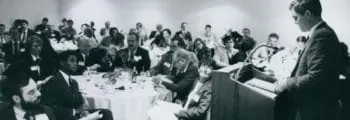
- New legislation strengthened penalties for Flee/Elude police.
- Court of Appeals opined on the right to have a union rep during questioning.
- POAM bargained first $30,000 contract wage for Sterling Heights.
April 8, 1983
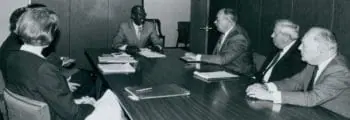
- The Michigan Employment Relations Commission (MERC) awarded POAM’s decision on a Duty to Bargain case.
- Southfield Police Officer Association (POA) received a 12% wage increase over 3 years.
April 11, 1984
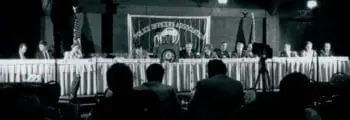
- Attorney General opinion allowed unions to bargain pension benefit levels.
April 11, 1985

- LEJ expert expressed value in interest arbitration.
- Pushed to support Act 312 & deny House Bills 4273 & 4413.
- Civilian dispatchers granted more access to Act 312.
- MERC heard a case from Frank Guido regarding the eligibility of corrections officers for PA 312. The case is later overturned in court, which was made available to them.
- Michigan legislature mounted an attack on PA 312/Arbitration.
- POAM hired Michigan Legislative Consultants as Lansing lobbyists.
- MERC awarded POAM’s argument to prevent Redford Township from changing pension benefits to retirees.
April 12, 1986

- Clinton Township received three 5% raises.
- HB5163 passed legislature to reduces threats of lawsuits against police officers.
- St. Clair County ordered to promote two deputies.
- City of Roseville ordered to pay longevity.
- Novi Police Department endorsed computerized video training.
April 12, 1987
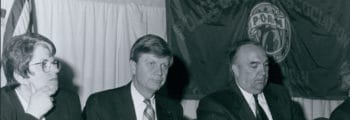
- MERC rules that grievances can be arbitrated after a CBA expires.
- MERC/Guido reinforced our right to collectively bargain.
April 12, 1988

- Bill introduced to eliminate residency requirements.
- POAM Annual Convention moved to Traverse City, Michigan.
- Federal death benefit increased to $100,000.
May 1, 1989
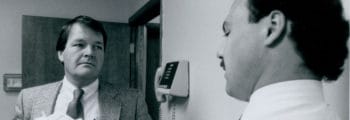
- Canton Township received a 13.5% pay increase over three years.
- 12-hour work shifts implemented.
- POAM’s Barry Howard appointed to the bench.
- In-car police computers introduced.
- POAM joined the National Association of Police Organizations (NAPO).
May 1, 1990
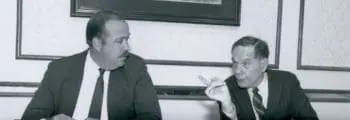
- Appointed to the MERS board.
- Automated Fingerprint Identification System is online in Livonia.
- The first union that offered representation for officers charged criminally.
May 1, 1991
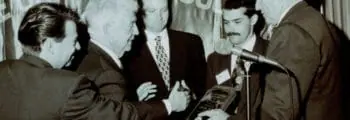
- Romulus received a 4% wage award at 312, which increased them to $32,240.
- Washtenaw County received a 3-year contract with 17.5% in wage increases, which took them to $34,095.
May 1, 1992

- PA321 made it a felony to wear a bulletproof vest while committing a felony – police officers were exempt.
- Saginaw Township received a 4% increase, which brought top wages to $35,484.
May 1, 1993

- 12-hour work shifts implemented in Westland.
May 1, 1994

- State Senator Bouchard introduced legislation to make on-duty accidents involving police officers eliminated from driving records.
- John Engler became POAM Man of the Year.
- Mail order sale of bulletproof vests were outlawed.
May 1, 1995

- Jim Tignanelli elected as the president of POAM and Beerbower elected as vice president.
- Deb Whyman introduced legislation to eliminate Recorders Court for out-county cases.
May 1, 1996

- POAM introduced a new criminal plan for members without restrictions.
- In-car cameras were introduced.
- East Lansing received a five-year deal, which took their top wages to $41,998.
May 1, 1997
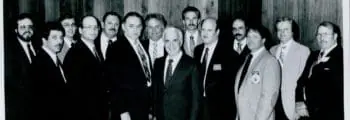
- POAM appointed to MLEOTC (now MCOLES) board.
- 117 duty deaths marked 36-year low in the United States.
- Supreme Court heard POAM’s appeal regarding continuing obligation on grievance representation.
- POAM registration plate introduced by SOS Candice Miller.
May 1, 1998

- POAM moved to Redford Township.
- The fight to eliminate residency received attention.
- Oak Park Police Department wages increased to $51,000.
- Regional dispatching came to Washtenaw County.
- Fireman’s Rule began to apply to police officers.
- Michigan Safety and Regulatory Unit joined POAM with 1,700 members.
- Pending legislation established Police Officers Bill of Rights.
May 1, 1999

- Kevin Loftis, an Oak Park officer, named to the POAM Executive Board.
- Police Officers’ Bill of Rights introduced on March 5 by Sen. Dave Jaye (R-Washington Township) at a press conference in the state capitol.
- Ottawa County Sheriff’s Department opened a new facility.
- East Lansing Police Department’s crime-fighting team used www.ci.east-lansing.mi for the arrests of several individuals who were directly involved in the destruction of downtown East Lansing during the riot on the night of March 27, 1999
- MJTC made new guidelines for reviewing grant applications.
- “Extra Leg” added many miles to POAM President’s “One Lap of America” – a six-day trip, 5,000-mile laps, where 104 cars set off on a journey across the U.S.
- 312 new names added NLEOMF memorial.
May 1, 2000
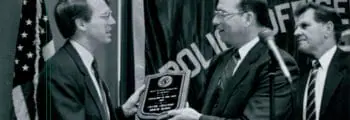
- POAM introduced regional seminars.
- George W. Bush endorsed as president of the United States.
- Residency legislation passed.
- $5/month ($60/year) gave members a POAM attorney that’ll represent them on any criminal charge while on- or off-duty.
May 1, 2001

- Fallen Heroes Fund introduced in Oakland County under Sheriff Bouchard.
May 1, 2002

- POAM received “consent judgment” to protect Garrity protections.
- POAM hired Washington D.C. lobbyists.
- Speed cameras were introduced.
- Annual Convention was held in Traverse City for the last time.
- POAM worked to correct concealed weapons law.
May 1, 2003

- Genesee County joined POAM.
- A new website was introduced.
- POAM began hosting its Annual Convention in the Amway Grand Plaza Hotel in Grand Rapids, Michigan.
May 1, 2004

- United States of America’s Vice President Dick Cheney served as the keynote speaker at this year’s Annual Convention.
- Lifeline program was enhanced.
- Sterling Heights Command joined POAM.
May 1, 2005

- Doug Gutscher and George Mertz hired as assistants general counsel.
May 29, 2006

- The start of the Metro Detroit Police Fire Pipe and Drum organization.
- Public safety mileage passed in Saginaw.
- POAM prevailed in getting a members’ medical insurance back after being wrongfully laid off by the employer and insurance being cut immediately.
“If fighting these kinds of battles is frivolous, then we’re guilty as charged,” said POAM President Jim Tignanelli
May 1, 2007

- Rudy Giuliani served as the keynote speaker at this year’s Annual Convention.
- POAM dominated in the southwest corner of the state – Calhoun and Van Buren counties, including deputies, corrections, and command officers.
- POAM protested circuit court’s ban on guns.
- A mutual agreement took place to change the work schedule.
- 12-hour shifts became the norm for some police officers, and sick time was reduced.
- 63 POAM municipalities used 12-hours shifts.
May 1, 2008

- Wayne County joined POAM.
- 10% penalty for early distribution of 401 funds was waived at age 50 for police and fire.
- POAM held the 5th Annual Police Appreciation Party on tap at the Tune Inn in Washington, D.C.
- The 2nd Annual visit to the Walter Reed Memorial Medical Center happened on May 13.
- Wayne County Deputies finally received the opportunity to vote on affiliating with our organization.
May 1, 2009

- Dearborn re-instituted defined benefit pension plan.
- Held the first National Joint Police Union-Management Executive Symposium in East Lansing at the Kellogg Hotel from October 27-31, 2008.
- POAM was successful in endorsing a high percentage of the winning candidates in the Michigan House.
- POAM hosted a convention seminar, Political Action 101. The seminar focused on the legal requirement to maintain active political support and avoid some commonly made mistakes, fundraising, communication, and organizing a political array, etc.
- POAM and Assistant General Counsel Douglas Gutscher represented the plaintiffs of the city of Oak Park’s retiree residents, who received increases in their prescription copays $15-$30.
May 1, 2010

- Law Enforcement Journals (LEJs) ended as the POAM website became fully involved.
- The legislation approved Weingarten rights as being automatically triggered by a criminal investigation by the Employer.
May 1, 2011

- Monroe Police headed to public safety and implemented 12-hour shifts.
- PA54 and PA152 were enacted, fundamentally changing collective bargaining.
- POAM Legislative Director, Kenneth E. Grabowski, and POAM Washington, D.C. Lobbyist Dennis McGrann, petitioned the U.S. government to allocate a more significant share of homeland security monies to law enforcement agencies.
May 14, 2012

- Nearly 300 police officers and public employees switched their union affiliation to POAM.
May 14, 2017
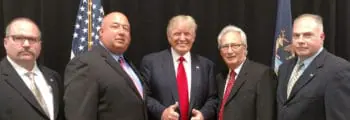
- Endorsed Donald Trump for the United States of America President.
- Introduced the POAM Leadership Council.
May 14, 2018

- Launched the POAM Mobile App.
- U.S. Senators Gary Peters (D-MI) and John Cornyn (R-TX) introduced bipartisan legislation to authorize funding for the Project Safe Neighborhoods program, a nationwide partnership between federal, state, and local law enforcement and prosecutors that uses evidence-based and data-driven approaches to reduce violent crime.
- AT&T of Michigan helped POAM award grant money to Michigan K9 departments with a $10,000 grant.
- POAM met with Michigan delegation of the newly elected 116th Congress.


Leave a Reply